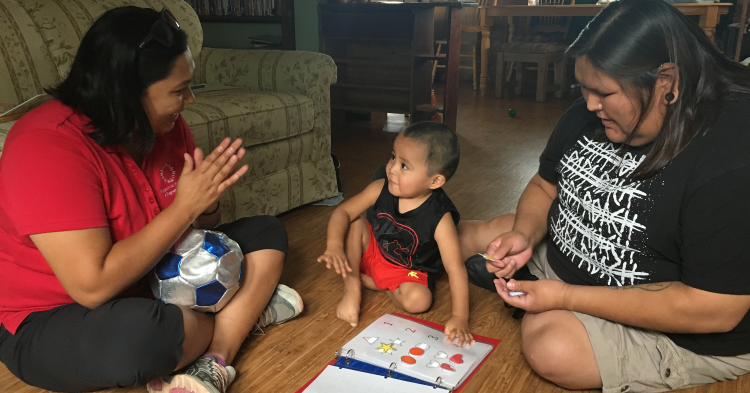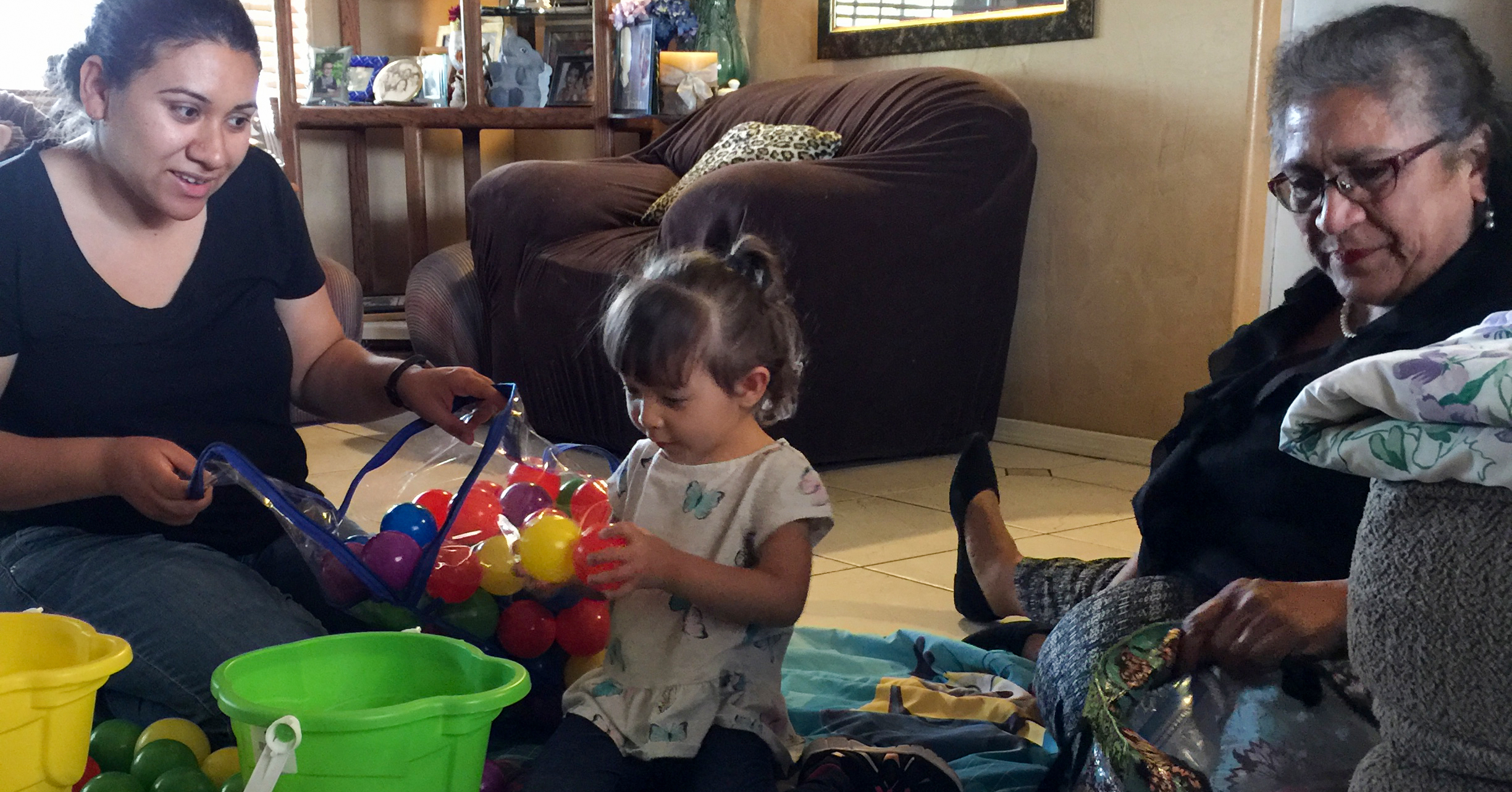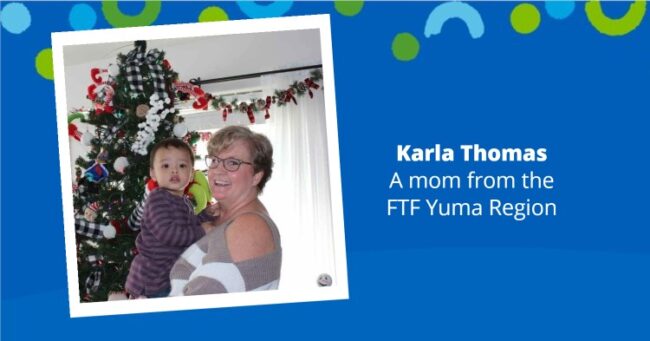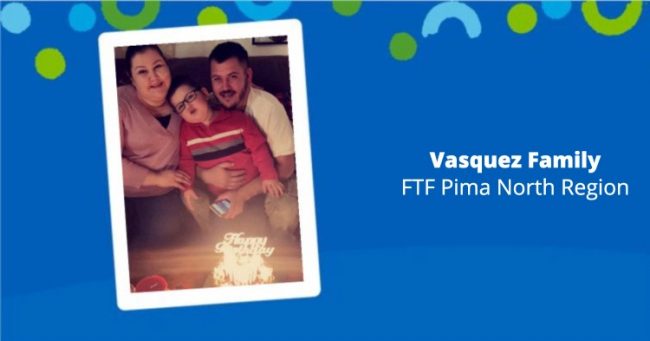
The effectiveness of home visitation depends on families feeling comfortable enough to invite trained home visitors into their homes at least once a month. So it’s no surprise that the key to success in the program is uniquely tied to the connection that the home visitor builds with families.
“We know that magic happens within the relationship that home visitors develop with families,” said Christine Waldbeiser, First Things First program specialist for family support and literacy. “When you hear the success stories, you hear that families cherish the relationship they have with their home visitor. They talk about them by name. They share successes and challenges. They say things like ‘My home visitor helped me be an advocate for my child.’”
As the largest funder of home visitation programs in Arizona, First Things First (FTF) is working with other state funders to find ways to support the home visiting workforce. When there is high staff turnover, data shows that it has an impact on the family’s willingness to stay in the program.
After a home visitor leaves the job, the families they work with often decline a worker change, refuse further service or don’t respond to outreach efforts, according to the latest FTF data analysis of funded home visitation programs.
“We’re looking at providing realistic expectations of what makes a home visitor successful, which includes manageable caseloads, supportive supervisors and access to professional development,” Waldbeiser said. “This also includes diving into salaries and what makes a livable wage.”
One challenge is helping home visitors and communities understand what their role is and what it isn’t. Here’s how home visitation works: the parent or primary caregiver receives regular in-home visits at no cost from a trained professional who provides parenting information, models ways to support healthy development and shares connections to other community resources.
These one-on-one visits with trained home visitors have been shown to support and empower families and children experiencing challenges, as well as to improve bonding and the relationship between parents and children.
Home visitation can be described as an intensive service, because home visitors meet with families frequently and collect a lot of information to learn about the family’s needs and to set family goals. The home visitors also have to feel comfortable and confident with the screenings and assessments that they’re doing, and why they are doing them.
For example, a home visitor might be the first to talk to a family about healthy relationships and intimate partner violence, which can have adverse effects on children and families. These are hard conversations, and it’s important that skills, roles and expectations are established.
“It’s not the home visitor’s role to be the solver of all challenges families face,” Waldbeiser said. “But they should feel confident in their role as a professional, advocate and coach that helps the family feel supported and have access to the resources they need. They are not only experts of their program, but also know where to go outside their program to refer families. They really are opening the door to challenging conversations and explaining to families why they are asking these questions.”
Lisa Colling, FTF’s senior director of evaluation, points to the work done by one of FTF’s funded grant partners after a deep look at the data that showed that staff turnover was a challenge throughout most FTF-funded home visitation programs.
The United Way of Tucson and Southern Arizona (UWTSA) and its Family Support Alliance (FSA) collaboration provides home visitation services throughout Pima County by partnering with school districts and other non-profit organizations.
UWTSA conducted an extensive staff survey and discovered that most home visitors who considered leaving their jobs did so because they felt their pay wasn’t commensurate with the amount of hours the work requires and the intensity of services and emotional burden that come with serving vulnerable families during the pandemic.
In addition, they found that home visitors were feeling increasingly disconnected from their colleagues and team members. The survey also highlighted the value and impact that skilled and supportive supervisors have on their teams. This was one of the main retention factors the FSA collaboration brought to the forefront.
“They did a survey of their home visitors and took the results back to their supervisor meetings,” Colling said. “They found that yes, salary is important, but equally important was good supervision – providing an outlet for the home visitors to talk about what they were encountering. It’s a stressful job, how and where can stronger supports be put into place?”
Cholpon Rosengren, UWTSA senior director of family support, said the survey information was shared over the course of multiple meetings with supervisors from all the partner agencies who made changes in their respective programs based on the data gathered through the surveys.
Some examples of these changes include:
- Revamped job postings to better describe expectations and responsibilities and to address challenges with hiring and retention by going upstream and selecting candidates who are the best fit for their program.
- Changing the format of job interviews to include experienced home visitors in interview panels to provide their perspectives and feedback on potential candidates.
- Required job shadowing with a home visitor before a prospective employee can accept a home visitor position.
- Creating formal mentoring programs to pair new hires with veteran home visitors for an extended period of time to provide peer support in addition to regular supervision.
Rosengren said supervisors took the data to heart, as well, and have changed the way they interact with their staff, including holding all supervisory sessions in person. They are also much more intentional about adding self-care and relationship-building to team meetings to maximize their time together.
“In our regular meetings, supervisors are sharing that these changes really mean a lot to the staff,” Rosengren said. “Most of the people who do this work do it because they care so much about children and families. Sometimes, the helpers need care as well.”









